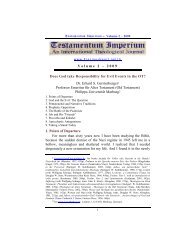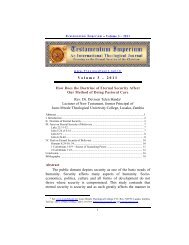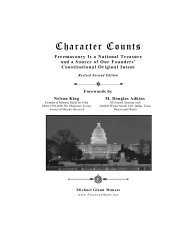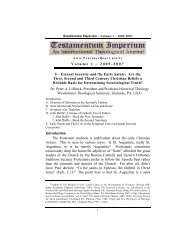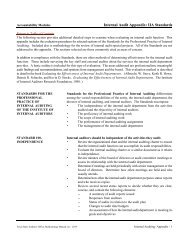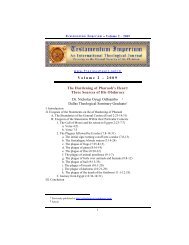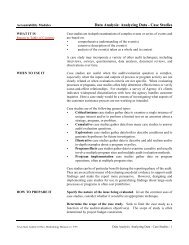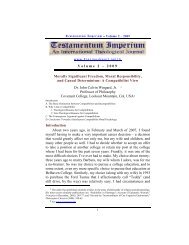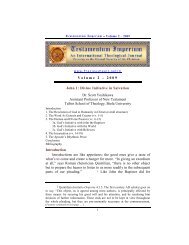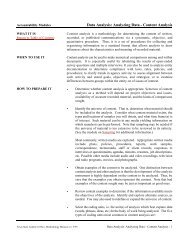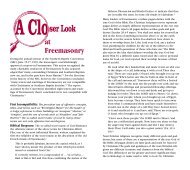Rev. Dr. Bernard O. Ukwuegbu, Election in ... - PreciousHeart.net
Rev. Dr. Bernard O. Ukwuegbu, Election in ... - PreciousHeart.net
Rev. Dr. Bernard O. Ukwuegbu, Election in ... - PreciousHeart.net
You also want an ePaper? Increase the reach of your titles
YUMPU automatically turns print PDFs into web optimized ePapers that Google loves.
Testamentum Imperium – Volume 2 – 2009www.<strong>PreciousHeart</strong>.<strong>net</strong>/tiVolume 2 – 2009<strong>Election</strong> <strong>in</strong> Ephesians 1: Individual or Corporate?<strong>Dr</strong>. <strong>Bernard</strong> Onyebuchi <strong>Ukwuegbu</strong> 1Catholic Priest of the Diocese of Orlu, NigeriaVice Rector and Chair of Biblical StudiesSeat of Wisdom Sem<strong>in</strong>ary Owerri, Nigeria 2IntroductionUnderstand<strong>in</strong>g the <strong>Election</strong> ConceptThe Theology of <strong>Election</strong> <strong>in</strong> the Old TestamentIsrael’s <strong>Election</strong> as Vocation<strong>Election</strong> <strong>in</strong> the New TestamentThe Elect <strong>in</strong> the New Testament<strong>Election</strong> <strong>in</strong> Paul’s Letter to the EphesiansEphesians 1:3-11 and the Nature of <strong>Election</strong>Beyond Ephesians: The Corporate <strong>Election</strong> of the ChurchIntroductionThe theology of election 3 is one of the themes that puts <strong>in</strong>toperspective God’s plan and will regard<strong>in</strong>g human salvation. It is also1 His books <strong>in</strong>clude The Prophetic Imag<strong>in</strong>ation & the Creation of Alternative community: ATheological Reflection on Israelitic Prophetic Tradition and its Relevance for our Church Today, Seat ofWisdom Lecture Series 2 (Owerri: Edu-Edy Publications, 2007; 52p), The Emergence of Christianidentity <strong>in</strong> Paul’s Letter to the Galatians: A Social-Scientific Investigation <strong>in</strong>to the Root Causes for thePart<strong>in</strong>g of the Way between Christianity and Judaism, Arbeiten zur Interkulturalität 4 (Bonn: VerlagNorbert M. Borengässer, 2003; 480p), Confrontational Evangelization: Foundations, Features &Prospects (Onitsha: Effective Key Publishers, 1995; 146p), An Open Letter to Dives and Lazarus(Enugu: SNAAP Press, 1993; 62p), and many articles with such journals as Oche-Amamihe: WisdomJournal of Theology and Philosophy, International Journal for the Study of the Christian Church,Catholic Biblical Quarterly, The Nigerian Journal of Theology, The Oracle, Ko<strong>in</strong>onia, Bullet<strong>in</strong> ofEcumenical Theology, Journal of Inculturation Theology, and Afrika Forum.2 Seat of Wisdom Sem<strong>in</strong>ary, P.O. Box 2124 - Owerri - Imo State, Owerri – Nigeria,www.swsem<strong>in</strong>ary.com and www.sws-ng.urbaniana.edu.3 I acknowledge my <strong>in</strong>debtedness to two of my sem<strong>in</strong>arians, Ernest Izummuo and PaschalOkpalaeke (both C.C.E.) whose <strong>in</strong>itial research on the topic provided the basis for the writ<strong>in</strong>g of thisessay.1
Testamentum Imperium – Volume 2 – 2009a theme that is basic to the self-understand<strong>in</strong>g of Israel and herScripture, as well as to the New Testament and the early Church. Butthe very idea that God “chooses a people or <strong>in</strong>dividuals to belong tohim <strong>in</strong> a unique way,” 4 has been a controversial one <strong>in</strong> the history ofthe Judeo-Christian tradition. Among the questions that thisconviction raises <strong>in</strong>clude: Is election the sovereign act of Godwhereby He chose some to salvation solely on the basis of sovereigngrace apart from their merits; or is the sovereign act of God wherebyhe chooses those whom He foreknew would respond to His gracious<strong>in</strong>itiation? Does God’s election embrace the entire humanity withoutdist<strong>in</strong>ction; or is it only for some special group of the elect? Is God’selection corporate, presuppos<strong>in</strong>g the <strong>in</strong>corporation of the <strong>in</strong>dividual<strong>in</strong>to the body of the “elect,” or is it <strong>in</strong>dividual, <strong>in</strong> which case everyelect is adopted directly und unmediated <strong>in</strong>to God’s family with fullfilial position and privileges?These are questions raised by Paul’s discourse on election <strong>in</strong> thevery beg<strong>in</strong>n<strong>in</strong>g of the first chapter of his letter to the Ephesians (1:3-14). Through an exam<strong>in</strong>ation of these passages, this essay argues thatGod’s election of the Church <strong>in</strong> Christ is <strong>in</strong> cont<strong>in</strong>uation of hiselection of Israel of old; that this election is utterly gratuitous andunconditional; that it has someth<strong>in</strong>g to do with mission, s<strong>in</strong>ce<strong>in</strong>dividuals are not elected for their own sake but for the sake ofservice; and that <strong>in</strong> the New Dispensation and accord<strong>in</strong>g to the eternaldesign of God <strong>in</strong>dividuals are elected by virtue of Christ’s election,and they (<strong>in</strong>dividuals) benefit from the grace of election by their<strong>in</strong>corporation <strong>in</strong>to the Church, the body of Christ. To understand theconcept of election <strong>in</strong> the first chapter of Ephesians, however, it isnecessary to review the election concept <strong>in</strong> the Hebrew Bible, andhow this was <strong>in</strong>terpreted <strong>in</strong> the Christian New Testament to <strong>in</strong>cludethe Church, the elect community of Jews and Gentiles.Understand<strong>in</strong>g the <strong>Election</strong> ConceptThere is no scholarly consensus on the precise def<strong>in</strong>ition of theterm election or the range of religious convictions <strong>in</strong> biblical sourcesto which the term may be properly applied. The classic Hebrew4 Shogren, G. S. “<strong>Election</strong>,” <strong>in</strong> D. N. Freedman (ed.), The Anchor Bible Dictionary vol. 2 (NewYork: Doubleday, 1992), pp. 434-444 (434).2
Testamentum Imperium – Volume 2 – 2009vocabulary express<strong>in</strong>g this term is r x;B', which means “to choose” or“to elect;” and <strong>in</strong> Greek, the verb evkl e,gomai, which means “tochoose” and the noun evkl ogh, election are used. 5 Prior to itstheological adaptation, the Hebrew r x;B' was used for everyday humanact of choos<strong>in</strong>g or select<strong>in</strong>g. It was equally used of human decisionsmade with<strong>in</strong> the moral and religious discourse of ancient Israel. TheAkkadian word “bêrum” (to choose) is the most important Semiticparallel to the Hebrew r x;B'. There is a l<strong>in</strong>k here to the Semitic idea ofsegullah, that is, of special possession (from the Akkadian sigiltu), aterm that is rooted <strong>in</strong> the Ancient Near East political sphere where thesovereign s<strong>in</strong>gles out his vassal by giv<strong>in</strong>g him a status of “sglt” whichmeans “special property.” Israel’s, however, was a unique situation <strong>in</strong>that theirs was the first time that a nation was <strong>in</strong>troduced <strong>in</strong>to thedoma<strong>in</strong> of the sacred, hav<strong>in</strong>g become the special possession of Godand the object of his special protection.The Theology of <strong>Election</strong> <strong>in</strong> the Old TestamentIn the Old Testament, election is the hermeneutical key to theunderstand<strong>in</strong>g and perception of the nature of God’s covenant withIsrael. 6 The verb, r x;B' (“to elect, to choose”), with its cognates occursover 164 times. Israel is the object of God’s choice and election.YHWH chose out this one people (Israel) as His own, bestow<strong>in</strong>g uponit a unique value. He chose her out of all peoples and set her apart.The particularity of Israel was expressed <strong>in</strong> the ancient Israelitesources by expressions such as “knew” ([ d;y") and “separated” (l d;B').Thus, that Abraham was known by God means that he was s<strong>in</strong>gled out<strong>in</strong> order that his descendants will keep justice and righteousness (cf.Gen 18:19). The same expression is found <strong>in</strong> Amos 3:2: “You alonehave I known from the families of the earth.” In the Hol<strong>in</strong>ess Code,the particularity of Israel is expressed by the phrase “separate,” “setapart” (Lev 20:26).5 For extensive treatment of the Hebrew term r x;B', see H. Seebass, “r x;B',” <strong>in</strong> J. G. Botterweck, H.R<strong>in</strong>ggren, H.-J. Fabry (eds.), Theological Dictionary of the Old Testament (Grand Rapids, Eerdmans,1977), 2:73-87; G. Quell, “evl e,gomai, <strong>Election</strong> <strong>in</strong> the Old Testament,” <strong>in</strong> G. Kittel (ed.) TheologicalDictionary of the New Testament, vol. 4, trans. Geoffrey W. Bromiley, (Grand Rapids: Eerdmans, 1964),145-171.6 Walbert Bühlmann, God’s Chosen People, translated from the German by Robert R. Barr(Maryknoll, New York: Orbis Books, 1982), p. 28.3
Testamentum Imperium – Volume 2 – 2009But although the religious convictions that Israel was the peculiarpossession of YHWH certa<strong>in</strong>ly goes back to the very beg<strong>in</strong>n<strong>in</strong>gs ofIsrael, and although earlier traditions reaffirm a unique and exclusiverelationship between Israel and YHWH, the use of r x;B' as atheological expression of this conviction appears for the first time <strong>in</strong>Deuteronomy. In this sense, the book of Deuteronomy could be saidto be responsible for the f<strong>in</strong>al theological elaboration of the doctr<strong>in</strong>eof election, even though it did not create it.Deuteronomy conceives the election of Israel as due to the loveYHWH had for Israel’s forefathers (Cf. Deut 7:6); and never becauseof Israel’s merits or number (Deut 9:4-6; 7:7). It is YHWH who “sethis heart on you and chose you” (Deut 7:7). Less Israel should bepuffed up on account of be<strong>in</strong>g the elect of YHWH, the author ofDeuteronomy was quick to add: “Not because you are greater thanother peoples did the Lord become attached to you and choose you –for you are the least of all peoples. No, it was for love of you…” (7:7-8). YHWH does not seek worth<strong>in</strong>ess, He bestows it. His choice ofIsrael is determ<strong>in</strong>ed by the nature of God, namely: His love; and notby the characteristics or excellence of Israel. In the words of Rowley,the term election po<strong>in</strong>ts to the <strong>in</strong>demonstrable mystery of the love ofGod for his people. 7 The only reason for Israel’s choice is to be found<strong>in</strong> YHWH’s will, <strong>in</strong> His <strong>in</strong>comprehensible love for His people, 8 <strong>in</strong> Hislov<strong>in</strong>g k<strong>in</strong>dness or covenantal fidelity (ds ,h,).However, election also conta<strong>in</strong>s a mission for the elect; and it isonly with<strong>in</strong> the context of this mission that the elect couldcomprehend God’s choice. Because of her election, Israel becomes apeople holy to YHWH, with the obligation of recogniz<strong>in</strong>g YHWHalone as God and of keep<strong>in</strong>g His commandments (Deut 4:39-40;7:9ff.). Be<strong>in</strong>g the elect places a responsibility on Israel, aresponsibility that is shared by no other nation. Failure to meet thisresponsibility br<strong>in</strong>gs severe consequences upon Israel. In fact, theresult of Israel’s election is to b<strong>in</strong>d her to a dest<strong>in</strong>y <strong>in</strong>comparable tothat of other nations, i.e., either extraord<strong>in</strong>ary prosperity orunparalleled misfortune (Deut 28).7 Rowley, H. H., The Biblical Doctr<strong>in</strong>e of <strong>Election</strong>, quoted <strong>in</strong> Seebass, “r x;B',” p.84.8 Shogren, “<strong>Election</strong>,” p. 435.4
Testamentum Imperium – Volume 2 – 2009While the technical term r x;B' was not frequently used <strong>in</strong> theprophetic books, the prophets often speak of a unique relationshipestablished at YHWH’s <strong>in</strong>itiative (see especially Hos 11”1-4; 4:2;9:1). Be<strong>in</strong>g “known” (([ d;y") by YHWH, a phrase found <strong>in</strong> most of theprophetic books, is <strong>in</strong>deed tantamount to hav<strong>in</strong>g been chosen orelected by Him. The prophets also underl<strong>in</strong>ed the mutually exclusiverelationship which existed between YHWH and Israel, the chosenone. The very identity of Israel was def<strong>in</strong>ed by this relationship somuch so that when the relationship is ruptured through Israel’sapostasy, the people lose that which dist<strong>in</strong>guishes them from othernations. Israel could come to its true identity only by a “conversion”of heart after the power politics and lust had brought them to ru<strong>in</strong>. 9God’s choice of Israel is not just an action that took place onceand for all <strong>in</strong> a distant past; it is a design that is realized permanently<strong>in</strong> a plurality of elections <strong>in</strong> which YHWH provides support for Hispeople. <strong>Election</strong> is unalterable because God is ever faithful to Hispromise, and will always restore stability to the order of election justas he restored the stability to the order of creation. This po<strong>in</strong>t is to beunderl<strong>in</strong>ed as it will help to shed light on the Paul<strong>in</strong>e emphasis onGod’s election of all <strong>in</strong> Christ before the foundation of the world (Eph1:4).Israel’s <strong>Election</strong> as VocationGod’s choice of Abraham and with him of Israel was for thebenefit of the rest of humanity: “… <strong>in</strong> you all the families of the earthwill be blessed” (Gen 12:3). In the concrete case of this one people,all peoples were chosen. The choice of Israel is not to be understoodexclusively but <strong>in</strong>clusively. Israel’s is a special case <strong>in</strong> which theelection of all peoples is to become visible and tangible. As Seebasssucc<strong>in</strong>ctly puts it:The horizon of the election of the people of Israel <strong>in</strong> theOld Testament is the peoples of the world, <strong>in</strong> relationship towhich as a whole the “<strong>in</strong>dividual” Israel was chosen. Baharas a technical term for the election of the people of Israelstands under the symbolism of universalism. 109 Shogren, “<strong>Election</strong>,” 438-439.10 Seebass, “r x;B',” 835
Testamentum Imperium – Volume 2 – 2009This same idea came <strong>in</strong>to fore especially with the Prophets.Accord<strong>in</strong>g to the prophetic writ<strong>in</strong>gs, Israel’s choice does not imply arejection of other nations. 11 Rather, they (the nations) are to bebeneficiaries of Israel’s election at the end of history. Especially <strong>in</strong>the classical prophets, we notice that the dist<strong>in</strong>ction between Israeland the nations is only provisional, and that at the denouement ofhistory, the nations will be <strong>in</strong>corporated <strong>in</strong>to the one people of God.One such passage, Isa 19:19-25 speaks of the conversion of Egypt andby implication of Assyria, the two great powers of Isaiah’s day toYHWH, conclud<strong>in</strong>g with an explicit reference to the electionlanguage. A similar idea is also found <strong>in</strong> the writ<strong>in</strong>gs of theanonymous prophet of Babylonian exile, the Deutero-Isaiah whoannounced the conversion and <strong>in</strong>corporation of all peoples <strong>in</strong>to Israel(Isa 45:20-25). Just as it was for the sake of the peoples that thepatriarchs and the prophets received their vocation, so Israel wascalled for the sake of the nations, who are always on God’s horizon.Passages <strong>in</strong> the Hebrew Scripture that run counter to this positionmust be considered <strong>in</strong> their literary genre. For example, when thesacred author places <strong>in</strong> YHWH’s mouth “Jacob I loved, but I hatedEsau” (Mal 1:2-3), this anthropomorphic manner of speak<strong>in</strong>g does notactually militate aga<strong>in</strong>st the unfathomable love of God that everembraces all human be<strong>in</strong>gs – <strong>in</strong>clud<strong>in</strong>g those whose “reprobation” ishere humanly dramatized. .” 12 Thus, it was not because God had nocare for other peoples that he chose Israel, but precisely because hecared for other peoples. Israel was not elected to a privilege but to aservice: to reveal God’s affection for all peoples.<strong>Election</strong> <strong>in</strong> the New TestamentIn the New Testament, the concept of election is understood asthe choice of God, hitherto carried out <strong>in</strong> the distant past, of thosewho will constitute the eschatological community of the Holy. Itequally applies to God’s selection of those who will render himspecial service <strong>in</strong> different ways (Gal 1:15-16; Acts 9:15; 13:47).Practically all the traditions of the New Testament were conv<strong>in</strong>cedthat Jesus was the chosen one, elected by the Father to fulfill His11 Only once <strong>in</strong> the Old Testament is it actually said that YHWH chose Israel and rejected someoneelse (Esau/Edom <strong>in</strong> Mal 1:2-3). See Shogren, “<strong>Election</strong>,” 440.12 Bühlmann, The Chosen Peoples, 35.6
Testamentum Imperium – Volume 2 – 2009eternal plan, namely, the salvation of the entire humanity (Luke24:46-48; Acts 3:20; Eph 1:9-10; 1 Pet 1:20; 2:4; <strong>Rev</strong> 13:8). Thosewho taunt and <strong>in</strong>sult Jesus accuse him of claim<strong>in</strong>g to be “the Christ ofGod, His Chosen One” (Luke 23:25). Some manuscripts of theGospels refer to Christ as the “Chosen One” (evkl ekt o,j ) <strong>in</strong> connectionwith God’s approval of him as the “beloved son” (cf. Isa 42:1; Matt12:8; John 1:34; Luke 9:35).The title “Chosen One” is derived from the servant passages ofIsaiah 41-42. Here, the Servant Songs conta<strong>in</strong> the language of electionand call<strong>in</strong>g when speak<strong>in</strong>g of the servant Israel and of <strong>in</strong>dividualservant (Isa 41:8-9; 42:1). In the early Church, the Servant Songswere read as predictions of Jesus 13 and by this the early Churchaffirmed that “Christ did not thrust himself upon this work, but wasduly chosen <strong>in</strong>to it; Christ was so God’s chosen as to be the head ofelection, and of all other Elect, for we are chosen <strong>in</strong> him.” 14 It istherefore Christ who forms the po<strong>in</strong>t of departure for any election <strong>in</strong>the New Testament.The Elect <strong>in</strong> the New TestamentIn the New Testament, the term elect conveys a relationship toGod which assures one of God’s security. In the teach<strong>in</strong>gs of Jesus,the elect refers to a group not closely def<strong>in</strong>ed but seem<strong>in</strong>gly aqualitative term which perhaps is analogous to the ‘righteousremnant’ of Old Testament prophecy. In Mark 13:20, God willshorten the days for the sake of the elect; false prophets will almostlead even the elect astray; at the end of time, God will convoke theelect from the four w<strong>in</strong>ds. In the parallel passage of Luke 18:7, we arealso told that God will v<strong>in</strong>dicate his elect (cf. Rom 8:33). 15In some way, it may be assumed that the elect are identifiablewith the Christian Church <strong>in</strong> the New Testament. 1 Peter 1:2addressed the exiles of the Dispersion as “chosen and dest<strong>in</strong>ed… andsanctified by the Spirit for obedience to Jesus Christ.” 1 Peter 2:9-10even went to the extent of explicitly tak<strong>in</strong>g over an Old Testament13 Cullmann, O., The Christology of the New Testament, revised edition (Philadelphia: Westm<strong>in</strong>ster,1963), 51-82.14 Matthew Henry, Commentary on the Whole Bible (U.S.: Hendrickson Publishers, 2005), p. 1672.15 G. E. Mendenhall, “<strong>Election</strong>,” <strong>in</strong> G. Buttrick et al (eds.), The Interpreter’s Dictionary of the BibleInterpreter’s Dictionary, vol. 2 (Nashville: Ab<strong>in</strong>gdon Press, 1985 repr<strong>in</strong>t), 76-82 (81).7
Testamentum Imperium – Volume 2 – 2009term<strong>in</strong>ology for Israel and apply<strong>in</strong>g it to the Christian community:“But you are ‘a chosen people’ [Isa 43:20], ‘a royal priesthood, apeople sanctified’ [Exod 19:6], ‘a people that was acquired for thepurpose of proclaim<strong>in</strong>g his deeds of renown’ [Isa 43:21] who hascalled you out of the darkness <strong>in</strong>to wondrous light. Once you were nopeople. But now you are a people of God.” Here, the author appliesthe classic texts of the chosen people’s covenant theology to thecommunities of the Church of Christ composed of Gentile Christians(cf. Titus 2:14; 1:1; <strong>Rev</strong> 17:14; 2 Peter 1:10; Col 3:12; 2 Tim 2:10; 2John 1:1 and 1 Thess 1:4).Like <strong>in</strong> the Old Testament (especially <strong>in</strong> Deuteronomy), the NewTestament also defends the thesis that election is at God’s <strong>in</strong>itiative,and that this does not depend on any quality of the <strong>in</strong>dividualrecipient. Paul speaks <strong>in</strong> 1 Cor<strong>in</strong>thians of God’s choice of the weak,foolish, despised and lowly <strong>in</strong> order to put to shame their opposites (1Cor 1:26-28). The same message is reflected <strong>in</strong> James 2:5 where Godis said to have chosen the poor to make them rich <strong>in</strong> faith. 16 In both<strong>in</strong>stances, there is a specific denial of any <strong>in</strong>tr<strong>in</strong>sic superiority on thepart of the chosen, so that “no human be<strong>in</strong>g might boast,” as Paulconcludes (1 Cor 1:29). In the New Testament therefore, election isgrounded deeply <strong>in</strong> the love and grace of God. 17But even though election is entirely gratuitous, there is need forthe elect to respond to gratuity of God’s choice. God’s election,therefore, must be confirmed by the faithfulness, obedience andpersonal appreciation of the elect. As such, no historical cont<strong>in</strong>uity ofbiological descent, political or social <strong>in</strong>stitution is necessary as aformal prerequisite by which the elect are to be identified (cf. John1:13). The elect, then, are not carriers of a badge of honour express<strong>in</strong>gpride or a claim of prestige and privilege of some social group.Rather, they are those who have responded to the call of God andconsequently manifest the characteristics of the elect. This responseof the elect, however, is never the ground or precondition for theelection. God’s election is completely gratuitous and completelyunconditional.16 See also the Magnificat of Mary <strong>in</strong> Luke 1:46ff.17 Mendenhall, “<strong>Election</strong>,” p. 818
Testamentum Imperium – Volume 2 – 2009<strong>Election</strong> <strong>in</strong> Paul’s Letter to the EphesiansThe letter to the Ephesians is among the greatest letters under thename of the apostle Paul. Though it has but six rather short chaptersand is written <strong>in</strong> an often pa<strong>in</strong>fully ponderous style, it conveysweighty doctr<strong>in</strong>es, warm exhortations and above all, an urgent<strong>in</strong>vitation to praise God. 18 In pr<strong>in</strong>ciple, Ephesians does not addressthe whole Church <strong>in</strong> Ephesus but only the members of Gentile orig<strong>in</strong>,people whom Paul had not known personally and who had beenconverted and baptized after his f<strong>in</strong>al departure from that city. 19 Thepurpose of the letter is to settle and establish the Ephesians <strong>in</strong> the truthand to further acqua<strong>in</strong>t them with the mystery of the gospel.The letter was written from Rome as Paul was <strong>in</strong> prison there. Ifthis position was uncontested up until the 18 th century AD; today,arguments have arisen to prove or disprove Paul<strong>in</strong>e authorship. Somewho argue aga<strong>in</strong>st a Paul<strong>in</strong>e authorship base their argument oncontent, vocabulary and style of the letter, which for them deviatesubstantially from the so-called authentic Paul<strong>in</strong>e letters.this argument, proponents of a Paul<strong>in</strong>e authorship propose that thecore of the letter is Paul<strong>in</strong>e, and attribute the variance po<strong>in</strong>ted outabove to the use of a disciple or scribe.Not m<strong>in</strong>d<strong>in</strong>g the conflict<strong>in</strong>g op<strong>in</strong>ions of the various scholarsabout the authorship of the letter, the thesis that is defended <strong>in</strong> thisessay is that the letter itself clearly identifies Paul as its author, andnot enough conv<strong>in</strong>c<strong>in</strong>g reasons have been offered to warrant ourreject<strong>in</strong>g this. What is more? The massive vision of a new humanity, anew household of God, ris<strong>in</strong>g together to reconcile warr<strong>in</strong>g humanbe<strong>in</strong>gs to each other and to God (chap. 2) – and all of this the productof God’s predest<strong>in</strong><strong>in</strong>g love (1:3-14) and unqualified grace (2:8-10) –is entirely <strong>in</strong> l<strong>in</strong>e with Paul’s emphases on God’s sweep<strong>in</strong>gsovereignty <strong>in</strong> constitution his people (Rom 9-11) and giv<strong>in</strong>g them the20Aga<strong>in</strong>st18 Markus Barth, Ephesians 1-3, The Anchor Bible 34 (New York: Doubleday, 1974), p. 319 Barth, Ephesians, p. 420 In the words of Onwukeme Victor, Be<strong>in</strong>g all th<strong>in</strong>gs to all peoples (Iperu-Remo: The AmbassadorPublications, 2007), p. 139: “The literary style (long sentences and frequent cha<strong>in</strong>s of nouns <strong>in</strong> thegenitive and a barrage of lofty phrases) raises doubt as to whether this is the work of Paul.”9
Testamentum Imperium – Volume 2 – 2009m<strong>in</strong>istry of reconciliation (2 Cor 5). All these fit well <strong>in</strong>to the generalpattern of Paul’s work. 21The Letter to the Ephesians is usually understood to consist oftwo ma<strong>in</strong> parts of about equal length: 1:3-3:21 and 4:1-6:2. They areheld together not only by the address (1:1-2) and the f<strong>in</strong>al bless<strong>in</strong>gs(6:23-24), but even more by the <strong>in</strong>terrelation of their contents. Whilechapters 1-3 are called dogmatic or kerygmatic, the contents ofchapters 4-6 are suitably labeled ethical, didactic or parae<strong>net</strong>ic. 22 Thesecond half (4-6) offers counsels on the contours of a correspond<strong>in</strong>gcounter-cultural, Christ-like cruciform lifestyle that is lived <strong>in</strong>anticipation of the completion of God’s glory, a k<strong>in</strong>d of warfareaga<strong>in</strong>st the spiritual forces that oppose the Spirit-empowered Church<strong>in</strong> the world. 23 The letter thus connects the grace of be<strong>in</strong>g <strong>in</strong> Christ,and hence of be<strong>in</strong>g <strong>in</strong>corporated <strong>in</strong>to God’s plan, to theresponsibilities associated with be<strong>in</strong>g <strong>in</strong> him.Ephesians 1:3-11 and the Nature of <strong>Election</strong><strong>Election</strong> – its subject, nature and purpose – is among the majorpreoccupation of Paul <strong>in</strong> the dogmatic section of his letter to theEphesians. After identify<strong>in</strong>g the recipients of the letter as “the sa<strong>in</strong>tswho are faithful <strong>in</strong> Christ” (Eph 1:1), Paul, <strong>in</strong> his usual epistolarythanksgiv<strong>in</strong>g declares:Blessed be the God and Father of our Lord Jesus Christ,who has blessed us <strong>in</strong> Christ with every spiritual bless<strong>in</strong>g <strong>in</strong>the heavenly places, even as he chose us <strong>in</strong> him (kaqw.jevxel e,xa t o h `ma /j evn ) before a u vt w /| the foundation of the world,that we should be holy and blameless before him. Hedest<strong>in</strong>ed us <strong>in</strong> love to be his sons through Jesus Christ,accord<strong>in</strong>g to the purpose of his will, to the praise of hisglorious grace which he freely bestowed on us <strong>in</strong> the21 To this extent, I agree with the thesis propounded by William Barclay several decades ago that“no man ever had a greater vision of Christ than this which sees <strong>in</strong> Christ the one centre <strong>in</strong> whom all thedisunities of life are gathered <strong>in</strong>to one. No man ever had a greater vision of the Church than this whichsees <strong>in</strong> the Church God’s <strong>in</strong>strument <strong>in</strong> that world-wide reconciliation. And one may well believe that noman other than Paul would rise to a vision like that.” Cf. William Barclay, The Daily Study Bible: TheLetters to the Galatians and Ephesians (Bangalore: Theological Publications, 1958), p. 68.22 Barth, Ephesians, p. 5323 Michael Gorman, Apostle of the Crucified Lord: A Theological Introduction to Paul and HisLetters (Michigan: Eerdmans, 2004), p. 504.10
Testamentum Imperium – Volume 2 – 2009Beloved. In him we have redemption through his blood, theforgiveness of our trespasses, accord<strong>in</strong>g to the riches of hisgrace which he lavished upon us. For he has made known tous <strong>in</strong> all wisdom and <strong>in</strong>sight the mystery of his will,accord<strong>in</strong>g to his purpose which he set forth <strong>in</strong> Christ as aplan for the fullness of time, to unite all th<strong>in</strong>gs <strong>in</strong> him,th<strong>in</strong>gs <strong>in</strong> heaven and th<strong>in</strong>gs on earth (Eph 1:3-11)The open<strong>in</strong>g word “blessed” (Euvl oght o,j ) declares the focus ofthis section. Paul affirms that God is blessed, and then elaborates onhow God expressed this blessedness towards humanity <strong>in</strong> salvation. 24The subject of the bless<strong>in</strong>g is God the Father, who has blessed therecipients of the letter with every spiritual bless<strong>in</strong>g. God is the activeagent all throughout the doxology and the benefactors of His activityare human be<strong>in</strong>gs. It is God who has “blessed” (v. 3), chosen (v. 4),“predest<strong>in</strong>ed,” “freely bestowed” (v. 5), “lavished redemption andforgiveness (vv7-8), “made known” and “purposed” (v. 9), given an<strong>in</strong>heritance, work<strong>in</strong>g everyth<strong>in</strong>g accord<strong>in</strong>g to His will (v. 11), sealed(v. 13), and given the Holy Spirit (v. 14).Of particular significance for us is that Paul here employs theverb evxel e,xat o (from evkl e,gomai ) the technical term for election,with God as the subject.25Paul here describes the s<strong>in</strong>gle attitude andact of God. One sees a reappearance of the Old Testamentunderstand<strong>in</strong>g of the concept of r x;B'<strong>in</strong> which God is always thesubject. The emphasis is on the subject, His activity and aim. God hasmade a specific choice, which is directed by His own purpose. Thepo<strong>in</strong>t of difficulty is the nature of God’s choice. Does it <strong>in</strong>clude thesense of choos<strong>in</strong>g out of a group, thus exclud<strong>in</strong>g a portion of them?While this may appear to be the correct read<strong>in</strong>g of the passage, thismust not necessarily be so given what we have already said about thevocational implications of God’s choice.Paul then goes ahead to assert that this choice is made “before thefoundation of the world,” us<strong>in</strong>g a word proori,saj whose rootmean<strong>in</strong>g is “to decide before hand” and which is used <strong>in</strong> the New24 Leslie James Crawford, “Ephesians 1:3-4 and the Nature of <strong>Election</strong>,” <strong>in</strong> TMSJ 11/1 (Spr<strong>in</strong>g2000) 75-91 (77). Surpris<strong>in</strong>gly, argu<strong>in</strong>g from the same passage, Crawford arrived at a differentconclusion thanks to his read<strong>in</strong>g of the “<strong>in</strong> Christ” formula <strong>in</strong> the benediction.25 Shogren, “<strong>Election</strong>,” p. 44211
Testamentum Imperium – Volume 2 – 2009Testament with reference to God’s eternal decrees. 26 In theEphesians’ context, proori,saj occurs as a participle qualify<strong>in</strong>g theelection verb previously stated. It specifies the action of God <strong>in</strong>eternity whereby He has fixed <strong>in</strong> advance the dest<strong>in</strong>y of the elect. Thenature of this dest<strong>in</strong>y is specified by the phrase “adopted as sons.” Bythis act of election, the elect has been taken <strong>in</strong>to God’s family and arebestowed with the family name and <strong>in</strong>heritance, as if they werenatural sons. 27<strong>Election</strong>, therefore, is not some div<strong>in</strong>e afterthought but part of an‘eternal purpose.’ God not only elects before the foundation of theworld; He is and rema<strong>in</strong>s the elect<strong>in</strong>g God when His grace is pouredout, when s<strong>in</strong>s are forgiven, when revelation opens the eyes of thehuman m<strong>in</strong>d. 28 Thus, election is eschatologically oriented. It is anevent which is still be<strong>in</strong>g fulfilled.Paul identifies the object of this election as “us” (h`ma/j ). This isprobably with reference to Christians <strong>in</strong> general, to whom theEphesians now belong. Given the context and what we know ofelection as a div<strong>in</strong>e act, there is no <strong>in</strong>dication of any preconditionsrelated to their election. It is accord<strong>in</strong>g to the good pleasure of God’swill (Eph 1:5); not for the sake of anyth<strong>in</strong>g foreseen <strong>in</strong> the elect. 29 Inthis way Paul reiterates the biblically rooted conviction of the gratuityof God’s election. In other words, God chooses not for the sake of anygood or excellence found <strong>in</strong> the elect, but <strong>in</strong>stead he chooses out oflove. He also chooses to make the elect holy, mak<strong>in</strong>g hol<strong>in</strong>ess thegreat end and design of election. But he does not choose because heforesaw that the elect would be holy; rather he chooses because he isdeterm<strong>in</strong>ed to make the elect holy and blameless before him (Eph1:4). 30Paul then <strong>in</strong>dicates that the “us” are blessed “<strong>in</strong> Christ” anddest<strong>in</strong>ed to be God’s children “through Christ.” The phrase “<strong>in</strong>Christ” also signals a dimension of the election theology that is very26 Leslie C. Allen, “The Old Testament Background of [pr o,] ovri,ze<strong>in</strong> <strong>in</strong> the New Testament,” NewTestament Studies 17 (October 1970), 104-10827 Matthew Henry, Commentary on the Whole Bible, p. 2307.28 Barth, Ephesians, p. 106.29 Matthew Henry, Commentary on the Whole Bible, p. 230730 Crawford, “Ephesians 1:3-4” observes that for Paul, God is here deal<strong>in</strong>g with humanity <strong>in</strong> itsfallen condition, which means the object of election are unbelievers, who will become believers onaccount of their election (see pp. 82-83).12
Testamentum Imperium – Volume 2 – 2009relevant to our discussion: namely its corporate nature. This phrase isa typically Paul<strong>in</strong>e, occurr<strong>in</strong>g mostly <strong>in</strong> his letters of all NewTestament writ<strong>in</strong>gs. It is especially frequent <strong>in</strong> Ephesians and more so<strong>in</strong> chapter 1. In 1:3-14 alone, it is found no less than eleven times.Many <strong>in</strong>terpretations have been given to this phrase, rang<strong>in</strong>g from themythical, mystical, existential, sacramental, local, historical andeschatological through juridical and ecclesiastical. As Barth rightlyremarks: “The impossibility of elaborat<strong>in</strong>g a f<strong>in</strong>al def<strong>in</strong>ition of themean<strong>in</strong>g of “<strong>in</strong> Christ” may have a simple cause: namely that Paulused the formula <strong>in</strong> more than one sense.” 31In the Ephesians’ context, the phrase denotes the relationshipformed between God and God’s people, rather than a bond establishedby faith or sacraments between Christ and <strong>in</strong>dividuals only. If God isthe one who elects and who blesses, Christ is the agent of God’seconomy, the one <strong>in</strong> and through whom God effects this economy ofsalvation. Paul repeatedly speaks of what God has done “<strong>in</strong>” or“through” Christ. First, <strong>in</strong> Christ God blessed them and chose thembefore the foundation of the world to be holy and blameless; andthrough Christ, God dest<strong>in</strong>ed them for adoption as his children (1:3-6). Second, <strong>in</strong> Christ they have redemption through his blood, theforgiveness of trespasses. In Christ God has made known the mysteryof His will, a plan for the fullness of time, to gather all th<strong>in</strong>gs <strong>in</strong>Christ (1:7-10). Thirdly, <strong>in</strong> Christ believers have obta<strong>in</strong>ed an<strong>in</strong>heritance <strong>in</strong> accordance with God’s purpose, and <strong>in</strong> Christ they haveheard the gospel and been sealed with the Spirit, the pledge of their<strong>in</strong>heritance (1:11-14). 32This way of understand<strong>in</strong>g the “<strong>in</strong> Christ” phrase saves Paul fromthe accusation of fatalism or determ<strong>in</strong>ism. If the person of JesusChrist is the prime object and subject, the revealed secret and<strong>in</strong>strument of God’s election <strong>in</strong> the new dispensation, and if herepresents all those elected, then all notions of a fixed will, testament,plan and program of God are not only <strong>in</strong>adequate but contrary to thesense of Ephesians 1. <strong>Election</strong> does not consist of the creation of ascheme which divides humanity <strong>in</strong>to two opposite groups: the elected31 Barth, Ephesians, 69.32 Frank J. Matera, New Testament Theology: Explor<strong>in</strong>g Diversity and Unity (Louisville/London:Westm<strong>in</strong>ster John Knox, 2007), 23013
Testamentum Imperium – Volume 2 – 2009and the rejected. Much more is it that person-to-person relationship oflove which exists <strong>in</strong> the relationship between God and His Son and isrevealed by the events that manifest this relationship. God’s electionis not an absolute decree. It is relative to the Son, his <strong>in</strong>carnation,passion, death and resurrection.The Church is the historical cont<strong>in</strong>uation of Christ <strong>in</strong> and throughthe community of those who believe <strong>in</strong> him, and who recognize himexplicitly as the mediator of salvation <strong>in</strong> a profession of faith. If theperiod before Christ was already encompassed by God’s salvific willand by his self-communication and election unto salvation, then theperiod after Christ, albeit the period of the Church, is all the moreencompassed by and bears the stamp of an explicit profession andknowledge of the fact that this Jesus Christ is the salvation of theworld and that <strong>in</strong> him God has offered himself to the worldirrevocably. 33When Paul, therefore, speaks of God’s election of the elect “<strong>in</strong>Christ”, he employs the phrase to describe (a) God’s election beforethe foundation of the world, (b) God’s sav<strong>in</strong>g and reveal<strong>in</strong>g action <strong>in</strong>the time of fulfillment, and (c) God’s present manifestation and claim<strong>in</strong> the congregation. The div<strong>in</strong>e economy – election – then, beg<strong>in</strong>swith God’s plan, f<strong>in</strong>ds its <strong>in</strong>itial fulfillment <strong>in</strong> Christ’s redemptivedeath, is presently experienced through the power of the Spirit (thepledge of their future <strong>in</strong>heritance), and will be brought to completionwhen every th<strong>in</strong>g <strong>in</strong> heaven and on earth is gathered <strong>in</strong> and f<strong>in</strong>ds itsunity <strong>in</strong> Christ. <strong>Election</strong>, therefore, is used here to designate God’scall ‘<strong>in</strong> Christ’ of Gentiles as well as Jews. It is God’s election of theChurch as the People of God. <strong>Election</strong> “<strong>in</strong> Christ”, therefore, issynonymous with election of God’s people <strong>in</strong> the Church. Only asmembers of the Church, as People of God, do <strong>in</strong>dividuals share <strong>in</strong> thebenefits of God’s gracious choice.No doubt Paul draws on the Hebrew Scripture <strong>in</strong> articulat<strong>in</strong>g hisviews on election. But while the Old Testament passages proclaim<strong>in</strong>gelection show a necessary particularistic or nationalistic slant <strong>in</strong>favour of the patriarchs and their physical descendants, Paul’s notionof election <strong>in</strong> Ephesians has a universal r<strong>in</strong>g. Not only Israel but the33 Karl Rahner, Foundations of Christian Faith: An Introduction to the Idea of Christianity,Translated by William V. Dych (New York: The Seabury Press, 1978), 322.14
Testamentum Imperium – Volume 2 – 2009nations too are <strong>in</strong>cluded <strong>in</strong> God’s love. 34 Though <strong>in</strong> form andsubstance, the benediction of Ephesians 1 closely resemblescontemporary Jewish berakah – a thanksgiv<strong>in</strong>g bless<strong>in</strong>g thatcelebrates the bless<strong>in</strong>gs God has bestowed upon his people – the<strong>in</strong>troduction of the words “<strong>in</strong> Christ” and the emphasis laid on Christrelationship to God and humanity reveal the unique character of thisChristian proclamation of eternal election. 35Beyond Ephesians:The Corporate <strong>Election</strong> of the ChurchIn f<strong>in</strong>e, the manner <strong>in</strong> which Ephesians presents the election ideacan be summarised as follows: <strong>in</strong> Christ, before the foundation of theworld, God chose and elected those who now f<strong>in</strong>ds themselves <strong>in</strong> theChurch. The choice is entirely at God’s lov<strong>in</strong>g <strong>in</strong>itiative withsalvation as the ultimate aim of His plan. This salvation is centered onChrist who plays a mediat<strong>in</strong>g role of br<strong>in</strong>g<strong>in</strong>g the whole strayedhumanity back to God. Christ achieved this by his death andresurrection; and <strong>in</strong> his name salvation is now be<strong>in</strong>g offered to Jewsand Gentiles alike through the m<strong>in</strong>istry of Paul.The Church is the body of this Christ, the visible and tangiblepresence of Christ <strong>in</strong> the universe. Through baptism <strong>in</strong>dividualChristians are <strong>in</strong>corporated <strong>in</strong>to this community and participate <strong>in</strong> thesav<strong>in</strong>g mystery of Christ’s death, resurrection and exaltation andbecome members of Christ’s body. Of course, the pilgrim People ofGod of the New Covenant is not the ultimate goal of election. Its endis the K<strong>in</strong>gdom of God, which has been begun by God himself onearth, and which is to be further extended until it is brought toperfection by Him at the eschaton. 36 The Church therefore is neitherthe first nor the last th<strong>in</strong>g. She does not exist for her own sake; nor isshe chosen for her own sake. Rather she is the elect by virtue of hermission and vocation: namely, to be a historical sign and <strong>in</strong>strumentof salvation. God’s economy of salvation will be completed when allth<strong>in</strong>gs are f<strong>in</strong>ally gathered <strong>in</strong> Christ, <strong>in</strong> the Church.34 Barth, Ephesians, 106.35 Barth, Ephesians, 108-9.36 Maximilian H. Heim, Joseph Ratz<strong>in</strong>ger: Life <strong>in</strong> the Church and Liv<strong>in</strong>g Theology (San Francisco:Ignatius Press, 2007), 81.15
Testamentum Imperium – Volume 2 – 2009The nature of election <strong>in</strong> Ephesians 1 therefore <strong>in</strong>volves a subtle<strong>in</strong>terplay of Christology and ecclesiology. On the one hand, the goalof God’s economy – His election – is to gather all th<strong>in</strong>gs <strong>in</strong> Christ. Onthe other, the Church plays a vital role <strong>in</strong> this consummation s<strong>in</strong>ce itis the body of Christ, the fullness of the one who is the head of allth<strong>in</strong>gs. For Ephesians, to be <strong>in</strong> the Church is to be <strong>in</strong> Christ, and to be<strong>in</strong> Christ is to be <strong>in</strong> the Church. 37The election theme has been elaborately developed and discussed<strong>in</strong> magisterial documents, especially <strong>in</strong> the Dogmatic Constitution <strong>in</strong>the Church, Lumen gentium of the Vatican II Council. As a matter offact, the central concern that God’s call always signifies convocationof a community of salvation runs through the second chapter ofLumen gentium. In the words of the Council Fathers:God… does not make men holy and save them merelyas <strong>in</strong>dividuals, without bond or l<strong>in</strong>k between one another.Rather has it pleased him to br<strong>in</strong>g men together as onepeople…. He therefore chose the race of Israel as a peopleunto himself. With it he sets up a covenant.The Council Fathers were quick to add that the call of Israel,however, as the first chosen People of God, is the prefiguration of theNew Covenant, which Christ established “<strong>in</strong> his blood” and whichconstitutes the New Testament People of God. This group is no longerrestricted to a s<strong>in</strong>gle nation or to one land, but rather embodies theuniversality of salvation for all humanity. In their own words:All these th<strong>in</strong>gs, however, were done by way ofpreparation and as a figure of that new and perfect covenant,which was to be ratified <strong>in</strong> Christ, and of that fullerrevelation which was to be given through the Word of Godhimself made flesh…. Christ <strong>in</strong>stituted this new covenant,the new covenant that is to say, <strong>in</strong> his blood (cf. 1 Cor11:25). 39Accord<strong>in</strong>g to Lumen gentium, therefore, the Church is connectedwith<strong>in</strong> the history of salvation with the Old Testament covenant3837 Matera, New Testament Theology, 231.38 Lumen gentium, 9. Citations from the documents of Vatican Council II are from Aust<strong>in</strong> Flannery(gen. ed.), Vatican Council II: Vol. I: The Conciliar and Post Conciliar Documents (Dubl<strong>in</strong>: Dom<strong>in</strong>icanPublications, 1988 rev. ed.)39 LG, 9.16
Testamentum Imperium – Volume 2 – 2009people, from whom the universality of the div<strong>in</strong>e salvific will was,however, still hidden. But the Church as the new People of God is notjust a cont<strong>in</strong>uation of old Israel without <strong>in</strong>tensification or <strong>in</strong>terruption.Its novelty is <strong>in</strong> the fact that “Christ won it as his possession throughhis death on the cross, blessed it with his Spirit, and unified it throughthe establishment of visible social bonds and promised that he wouldrema<strong>in</strong> with it always.” 40 As the head of the new covenant people,Christ by send<strong>in</strong>g his disciples to all nations (cf. Matt 28:16-20)fulfilled the eschatological hopes of the patriarchs and the prophetsand [called] together a people made up of Jews and Gentiles, mak<strong>in</strong>gthem one, not accord<strong>in</strong>g to the flesh but <strong>in</strong> the Spirit. This was to bethe new People of God. 41 The Church as the “People of God” thusbecomes the fundamental concept on the basis of which the mysteryof the Church as the new elect can be grasped.40 Heim, Joseph Ratz<strong>in</strong>ger, 82.41 LG 9.17



